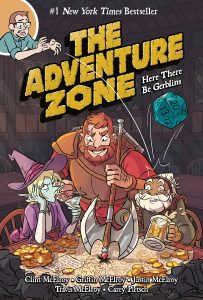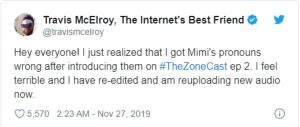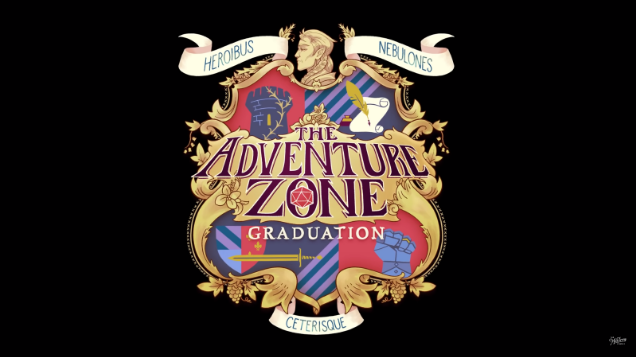The Adventure Zone: Graduation Deals with Criticism
The Adventure Zone with its latest campaign, Graduation, has been taking some heat recently across social media. Fans have been asking the Dungeon Master, Travis, to address their issues. But should he feel obligated to do so?
Contains spoilers for The Adventure Zone: Balance and The Adventure Zone: Graduation.
As a group, fans of The Adventure Zone can’t agree on much – besides the appearance of Garfield the Deals Warlock, obviously, who everyone knows looks like that.
The third and current campaign, Graduation, is dividing us once again. The criticisms being leveled at the show have reached the point that, since the last episode’s release, DM Travis McElroy has made a comment on his Twitter about it. The remarks he gave were full of tongue-in-cheek confidence, and there was some response suggesting that Travis should have taken the concerns and criticism more seriously, and answered them earlier.
Some people are saying that Graduation is too directionless; others are saying Travis is railroading. Some are saying he’s spending too much time with NPCs; others are saying they don’t remember any of the NPCs’ names, and they want to get to know them better. Some are saying the Pegasus scene in the first episode, “Orientation”, is their favorite of the campaign so far; others are saying it came far too soon and didn’t feel earned. Some are saying there’s no sense of mystery and everything’s too fluffy, and others are saying the mystery is being shoved down the audience’s throats. Some are saying Travis’s voices are too intense and distracting, others are saying they’re not distinct. Some are saying the stakes aren’t high enough, others are saying they don’t want any big story to kick in too soon before we’ve got to know the player characters better. Some are saying he needs to change everything and others are saying these are their favorite episodes of The Adventure Zone so far.

In the past, the McElroys have engaged with criticism in a way that has felt practically pioneering, despite the fact that their open attitude ought to be par for the course. In Petals to the Metal, DM Griffin McElroy played into the ‘bury your gays’ trope with the fate of the characters of Sloane and Hurley; reading his brief but thoughtful answer to fans’ concerns convinced me to keep listening despite being upset by the storyline he chose. When the graphic novel of the podcast was released and fans expressed disappointment and hurt over the character designs, a long blog post was made as a response.
In their occasional The ‘The Adventure Zone’ Zone (TTAZZ) episodes, the four McElroys don’t shy away from addressing problems that, in retrospect, they realize are there in the show. This covers not only questions of representation, but also plotlines and game mechanics.
Most recently, they engaged openly with the issues they felt they’d fallen into with their second campaign of the show, Amnesty. This willingness to talk about their flaws is attractive, as a listener. It’s fun to listen to – it feels involving, and creates a sense of the McElroys’ accountability and desire to create good storytelling and representation of diverse characters.
Graduation, like literally any single thing in the world besides cute dogs, is easily critiqued. The question that I have been left with most of all at this early stage is, are the four McElroys playing to their strengths in this campaign?
Personally speaking, I found Travis’s greatest strength in Balance to be how much his character, Magnus, cares. He cares to the point of foolishness. He cares very obviously. Travis takes the characters that Griffin gives him, and likes them so much that it makes us like them; as early as episode two of Balance, Griffin says to Travis, “I love this narrative thread of you trying to befriend everything that tries to kill you.” Travis connects with characters in a way that’s second to none. We barely met Julia in the show and yet the scene where Magnus was reunited with her was incredibly moving, because Travis was so, so good at showing how much Magnus loved her. The way that Travis made a connection with Fisher gave that narrative thread its heart.
Griffin, meanwhile, is fantastic at coming up with situations that create drama and hilarity. Fitzroy’s backstory is a great example, as are many of the early moments that fans credit with having hooked them into Balance: the Magic Brian and Gundren Rockseeker mixup, the entire Klaarg affair. He’s comfortable moving pieces around the board in a way that makes them entertaining. As a player rather than a DM, he focuses mainly on his own character and the situations he’s in and how to make them funny, and doesn’t tend to embrace NPCs in the same way that Travis does.
This is manifesting in Graduation with Travis making NPCs that he loves, but who aren’t currently being adopted into the gang by the player characters; meanwhile Griffin, without the ability to engineer scenarios beyond his own backstory, isn’t in prime position to make the most of the style of humor he’s used so far in the show. None of which is to say that this campaign can’t work; it’s just a question of flexing new muscles, and finding a new rhythm – and a new way to entertain listeners who originally followed the show because they were fans of Griffin’s style of DMing and Travis’s style of play.
I say all of this while being very excited about what’s to come in Graduation, and being fully aware that other fans will completely disagree with what I’ve said. We’re supposed to disagree. What makes us fans is that we think and feel things about the show, and – without wishing to be trite – what makes us human is that what we think and feel will be wildly different from one individual to the next. It’s natural that we have strong opposing opinions. There are no rules, written or unwritten, that govern what you can think about The Adventure Zone. Where things become a little foggier is the point at which the creators of the show have an obligation to interact with you about your thoughts.
The McElroys’ history of active listening to their fans, and the culture of sensitivity and safety that has grown out of that choice, sets the door ajar for anyone to demand recognition and public address. As individual fans, that puts the onus on each of us to self-regulate, and not throw every personal quibble through the door along with the larger issues. But how to do that? The McElroys cannot create a podcast that works for everyone. They cannot take into account every subjective opinion. Yet their ability to thoughtfully listen to their fans when they’ve caused hurt has been hugely appreciated in the past. So, at what point is it the right time to tag Travis McElroy in your thread, or reply to his tweets demanding that he give a more in-depth response to the criticism he’s been receiving?
And can we treat issues of representation and more general storytelling the same? If the depiction of a character or scenario has caused offense – that is, if Travis has made use of ideas or language that cause damage to a community – to request Travis’s attention and inform him of the hurt he’s caused seems, judging by his past and that of his family, to be something he’d actively want and encourage. Something that would be right, even if that encouragement weren’t there.
However, insisting that attention be paid to the delineation of issues with the show that caused no offense, only at most some frustration at the game not being played to personal taste in how to run a campaign; this has a very different flavor. And as mentioned before, the criticisms being leveled at Graduation are varying, contradictory, and in large part related to issues with game mechanics and narration.

And this is exactly as it should be – there should be parts of the narrative that each of us doesn’t like as much as the rest. We should feel able to talk about it, at length, with civility. But expecting comment from Travis about the mechanics of his game – after only five episodes, without any benefit of hindsight for him or us whatsoever, as there would be in an episode of TTAZZ – that’s a great deal to ask.
There are many more experienced DMs than Travis, and as with any creation, his campaign could likely benefit from the input of people who have had longer to hone their skills. There are Reddit threads and Facebook comments and Tumblr posts and countless tweets out there, full of advice for him to read and use. The community provides so much knowledge and so many resources.
But none of the people offering their wisdom, from those talking among themselves to those demanding a response and justifications from him on Twitter, knows what it is Travis is planning – what he’s trying to achieve. The advice being given, if taken, would make the campaign run closer to the adviser’s likes and values. Yet this is The Adventure Zone: Graduation and the question here is, what does Travis like, and what does he value?
On the grounds of making a “better” story, Travis has no obligation to engage with criticism of his plotline and mechanics. Those criticisms might be warranted, and the advice that’s given might improve the campaign in the view of multiple listeners – but that fact carries no moral weight. It is not an unkindness to choose to focus on his story as he wants to tell it. He will not craft a campaign that all of us will like, because that’s an impossibility. If he attempts to please us all or even a majority of us, his story will fall out of his own grasp. Simply put, it will not work. The right time to make these criticisms is whenever; the right time to insist Travis must pay attention is, in my view, not ever.
Following any story is an act of trust in its creator. Having the creator available on Twitter and seemingly ready to be taken to task can lead to a sense of control replacing the trust, but ultimately this campaign is the work of Travis McElroy, and it’s his choice how to run it. Travis has people across the board, over various social media, giving advice and criticism that in many cases is absolutely diametrically opposed. He cannot possibly implement all of it, and there is no compulsion whatsoever for him to implement any of it. A fair amount of it isn’t even constructive advice. Most overwhelmingly, the comparisons to The Adventure Zone: Balance are seemingly never-ending.
Balance, in its infancy, had the excitement and concurrent leniency of the McElroys playing Dungeons and Dragons for the first time. The episodes they produced in the Here There Be Gerblins arc are not without issue; as with many shows, The Adventure Zone often takes a little willpower to get through at first, and many friends to whom I’ve recommended the show have taken a few attempts to get through those first hours of the campaign.
It’s high up on my list of favorite arcs, looking back, but experiencing it for the first time can be a turn-off experience. Going by episode count, as Travis himself has mentioned, at the point in Balance equivalent to where we are now in Graduation, the Tres Horny Boys were just leaving Wave Echo Cave. Counting in minutes rather than episodes, they’d just arrived on the Moon for the first time. They’d had some excellent goofs, but they were just barely breaking into the storyline and the direction of the campaign. This sounds familiar when thinking about Graduation.
For many, Balance has reached practically mythological status in the fandom, and not undeservedly so. However, it’s become a measure against which everything else in the show is held, which is inevitable but also perhaps ultimately unhelpful.
A majority of The Adventure Zone’s extensive fanbase hasn’t followed the show from the very beginning, and experienced the first arc, if not the whole of the first campaign, on a binge. To consume in one large chunk without pausing to re-listen or engage critically is vastly different to listening to one episode every two weeks, as we’re doing now with Graduation.
The baby steps of this campaign are being analysed in a way that those of Balance never were. And to expect Travis to linger over, address, and even self-flagellate over concerns that Graduation isn’t the same as Balance is to expect something unhealthy for him and for the show. No, the show isn’t the same. And no, the style of running the game might not be the one fans followed the show for at first. This does not mean the campaign is objectively not good, or that every concern implies a morally obligated personal address from the DM.

We can hope that the open door of communication that’s given to fans through the McElroys’ online engagement is something that continues to remain. It’s led to so many learning opportunities through the years. The level of responsibility and thought that goes into these current episodes of The Adventure Zone is clearly a world apart from how it began. When it comes to representation of minority communities, that seriousness is hugely appreciated and badly needed.
When it comes to the game mechanics and storyline, though, the demands to address criticism – and the level of serious thought that encourages – feel counter-intuitive in a show like The Adventure Zone, where the moments of truest joy spring from the McElroys exercising their considerable collective talent for improvised humor. If every game mechanic and choice has to be addressed later, then when the show is recorded, each player and the DM will be constantly considering what narrative move to make that’s funny but also able to be justified on Twitter. It will lead to a show that is careful and placed, where – if I may be so bold as to try to sum it up – the heart of TAZ as far as I’m concerned is a sort of very stupid and unexpectedly emotional outrageousness. It soars when it’s narratively unjustifiable.
So, here’s hoping that the show sometimes just doesn’t make sense, and the narrative criticisms are a wild fantastic mess, and the McElroys engage with it at their own discretion – which I have come to trust through witnessing their years of increasing accountability. Here’s hoping they can make a show that’s debated and discussed and loved and disliked, and that’s a joy to make, and that they can be earnestly proud of on the other side of its creation.
Here on The Geekiary we have reviews of every episode so far, and we’re looking forward to more.
Author: Em Rowntree
I’m a non-binary writer, teacher, and cat-lover from the UK.
Help support independent journalism. Subscribe to our Patreon.
Copyright © The Geekiary
Do not copy our content in whole to other websites. If you are reading this anywhere besides TheGeekiary.com, it has been stolen.Read our








Let’s face it: Travis is not a good DM. He may become a better one, but having been exposed to him for a decade on MBMBAM and all the McElroy podcasts, he really is fluffy and without substance. The names in Graduation are just atrocious. The pegasus scene was definitely unearned. At least Justin continually amuses me by pointing out how boring and railroaded things are going. Justin’s Firbolg clears the imp hospital adventure, literally shouting “NEXT!” when they come upon empty rooms and boring encounters.